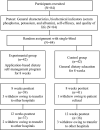Randomised controlled trial of a smartphone application-based dietary self-management program on haemodialysis patients
- PMID: 33377565
- PMCID: PMC8048988
- DOI: 10.1111/jocn.15627
Randomised controlled trial of a smartphone application-based dietary self-management program on haemodialysis patients
Abstract
Aims and objectives: To develop a smartphone application-based dietary self-management program for haemodialysis patients and to examine its effects on biochemical indicators, self-efficacy and quality of life.
Background: Lack of dietary management in haemodialysis patients can lead to serious complications such as oedema, hyponatremia, hyperkalaemia, hypertension, uraemia and eventually death; however, studies using smartphone applications for dietary self-management in haemodialysis patients are rare.
Design: A prospective, single-blind, randomised, controlled design with repeated measures was followed with 75 haemodialysis patients at a haemodialysis centre. Data were collected from 10 January 2017-6 May 2018. The study applied the Consolidated Standards of Reporting Trials statement.
Methods: The 8-week smartphone application-based dietary self-management program was developed through collaboration with a haemodialysis equipment company. The experimental group took this program while the control group took an 8-week general program. Study variables were serum phosphorus, potassium and albumin, self-efficacy and quality of life. They were measured at pretest, and 8 weeks and 12 weeks after the programs, and analysed using two-way repeated measures analysis of variance.
Findings: The smartphone application-based program significantly improved serum phosphorus, potassium, self-efficacy and quality of life over time compared with the general program. There was no significant difference in albumin level changes between the groups.
Conclusions: The smartphone application-based dietary self-management program is an opportune and effective nursing intervention to lower serum phosphorus and potassium levels in haemodialysis patients over time. Trial registration was performed on www.cris.nih.go.kr (KCT0005366).
Relevance to clinical practice: Haemodialysis patients can easily use the smartphone application to manage their diet anytime and anywhere. They can get real-time feedback and solutions to prevent haemodialysis complications. Nurses can provide tailored high-quality care based on an individual's lifelog data from the smartphone application.
Keywords: diet; haemodialysis; mobile applications; patient; self-management.
© 2020 The Authors. Journal of Clinical Nursing published by John Wiley & Sons Ltd.
Conflict of interest statement
There is no conflict of interest.
Figures
References
-
- Benner, D. , Brunelli, S. M. , Brosch, B. , Wheeler, J. , & Nissenson, A. R. (2018). Effects of oral nutritional supplements on mortality, missed dialysis treatments, and nutritional markers in hemodialysis patients. Journal of Renal Nutrition, 28(3), 191–196. 10.1053/j.jrn.2017.10.002. - DOI - PubMed
-
- Frih, B. , Jaafar, H. , Mkacher, W. , Ben Salah, Z. , Hammami, M. , & Frih, A. (2017). The effect of interdialytic combined resistance and aerobic exercise training on health related outcomes in chronic hemodialysis patients: The Tunisian randomized controlled study. Frontier in Physiology, 31(8), e288. 10.3389/fphys.2017.00288. - DOI - PMC - PubMed
Publication types
MeSH terms
Grants and funding
LinkOut - more resources
Full Text Sources
Other Literature Sources




